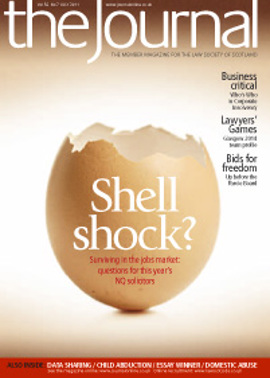Too much heat, not enough light

The Government’s decision to delay the Offensive Behaviour at Football and Threatening Communications Bill to allow more effective scrutiny has been widely welcomed, but effective sanctions for sectarian behaviour already exist. Delaying (or even abandoning) the bill will not mean that individuals will face no criminal sanctions, or that penalties lack severity.
The bill provides for sentencing up to the maximum allowed in the sheriff court. At 12 months (summary) or five years (indictment), the imprisonment available is thus no different to that under the Criminal Justice and Licensing (Scotland) Act 2010, s 38. This covers behaving (intentionally or recklessly) in a threatening or abusive manner which would be likely to cause fear or alarm to a reasonable person. The conduct envisaged in the bill – expressing or stirring up hatred against a defined group so as to be likely to incite public disorder, particularly in the context of crowd behaviour at football matches – is thus already covered. If sufficient to be likely to incite public disorder, particularly when done en masse, it would amount to threatening behaviour likely to alarm a reasonable person. The expression of hatred through chants would also fall within s 38. And for common law breach of the peace, the sheriff again can pass sentence up to the sheriff court maximum.
It is worth noting that sentencing for both offences can be added to by way of the statutory aggravations, a useful means for more fully reflecting the crime committed. However, since s 1 of the bill defines itself in terms of conduct specified therein as expressions of religious or racial hatred, or hatred based on other forms of prejudice, there would be no scope for applying the further aggravation. Consequently, there may be circumstances where the bill offences would actually attract lesser maximum sentences than are available under the existing provisions with an appropriate statutory aggravation libelled.
The application of the existing laws to sectarianism in football can be explored by reference to the High Court’s judgment in Walls v Brown [2009] HCJAC 59. During a match between Kilmarnock and Rangers, the appellant had repeatedly sung part of the “Famine Song”, shouted sectarian abuse, gestured towards the opposing supporters, ignored repeated requests from stewards that he sit down, and refused to leave the ground when asked to do so. He was convicted of a breach of the peace, aggravated by religious prejudice under s 74(2) of the Criminal Justice (Scotland) Act 2003 and by racial prejudice under s 96(2) of the Crime and Disorder Act 1998. He was placed on probation for 18 months and given a two-year football banning order (FBO).
On appeal, Walls contended (inter alia) that the “Famine Song” did not contain racist elements and was a legitimate expression of political opinion, while comments about “Fenian fuckers” were a legitimate criticism levelled at the Fenian Brotherhood organisation. If these references were seen in their proper context there could be no breach of the peace, given there was no evidence of anyone actually being caused alarm or distress and that such swearing was commonplace at a football match. However, the High Court confirmed the sheriff’s assertion that a breach of the peace may occur where the conduct complained of is “severe enough to cause alarm to ordinary people and threaten serious disturbance to the community”: “Even in the context of a football match... presence inside a football stadium does not give a spectator a free hand to behave as he pleases. There are limits and the appellant’s conduct went well beyond those limits... It is a legitimate inference that persons in the crowd are likely to be alarmed and disturbed by such behaviour and that it does have the potential to cause or threaten serious disturbance” (paras 18-20).
The testimony of a police superintendent that he, like most fans, knew the remaining words of the “Famine Song” (not sung by Walls), that he found those words offensive, and that “sectarian and bigoted chants could have an impact on parts of a football crowd... were they to take offence” (para 2) was combined with evidence from two stewards that they were “bothered” by the potential for an adverse reaction from the crowd. Although there had been no such reaction – and Walls had got some of them to join in – the stewards’ evidence as to the totality of his behaviour took him comfortably beyond the bounds of what was acceptable.
Finally, the two-year FBO is noteworthy because most FBOs imposed in Scotland are for one year, but it was held appropriate given Walls’s extensive criminal history. His singing of the “Famine Song” was probably the least significant aspect of the case and, contrary to media reporting, would have had little bearing on the sheriff’s decision – but those legal and political misconceptions are entirely in keeping with the misinformation that has equally bedevilled the discussions around the current bill.
In this issue
- Employee ownership: untapped succession solution for legal firms
- Cash call: cornering the council tax
- Tobacco Act sound
- Public profile
- Too much heat, not enough light
- Newly hatched
- Money matters
- Families in fear
- Get out of jail?
- People's choice
- E for explanation
- Who's Who in Corporate Insolvency
- Care with sensitive case papers
- Bullying: time to crack down
- SYLA reports successful year
- Middle East: back to growth
- Sheriff court auditor role to be restricted
- Law reform update
- From the Brussels office
- Solicitor's guide to internet porn
- Ask Ash
- Data sharing – the good practice guide
- Legal Risks – a conference reviewed
- Long-term solutions
- Removing hardship?
- 18 or 21?
- Lenders in the shade
- Demolition derby
- Time to come clean
- Scottish Solicitors' Discipline Tribunal
- Website review
- Book reviews
- Going the distance
- Fashion retailing comes to court






